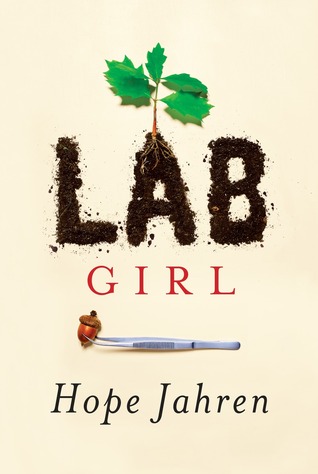
Title: Lab Girl
Author: Hope Jahren (Audio read by the author)
Publication Info: Random House Audio, 2016. Hardcover by Knopf, 2016 (290 pages)
Source: Library digital resources
Publisher's Blurb:
Acclaimed scientist Hope Jahren has built three laboratories in which she’s studied trees, flowers, seeds, and soil. Her first book is a revelatory treatise on plant life—but it is also so much more.
Lab Girlis a book about work, love, and the mountains that can be moved when those two things come together. It is told through Jahren’s stories: about her childhood in rural Minnesota with an uncompromising mother and a father who encouraged hours of play in his classroom’s labs; about how she found a sanctuary in science, and learned to perform lab work done “with both the heart and the hands”; and about the inevitable disappointments, but also the triumphs and exhilarating discoveries, of scientific work.
Yet at the core of this book is the story of a relationship Jahren forged with a brilliant, wounded man named Bill, who becomes her lab partner and best friend. Their sometimes rogue adventures in science take them from the Midwest across the United States and back again, over the Atlantic to the ever-light skies of the North Pole and to tropical Hawaii, where she and her lab currently make their home.
Lab Girlis a book about work, love, and the mountains that can be moved when those two things come together. It is told through Jahren’s stories: about her childhood in rural Minnesota with an uncompromising mother and a father who encouraged hours of play in his classroom’s labs; about how she found a sanctuary in science, and learned to perform lab work done “with both the heart and the hands”; and about the inevitable disappointments, but also the triumphs and exhilarating discoveries, of scientific work.
Yet at the core of this book is the story of a relationship Jahren forged with a brilliant, wounded man named Bill, who becomes her lab partner and best friend. Their sometimes rogue adventures in science take them from the Midwest across the United States and back again, over the Atlantic to the ever-light skies of the North Pole and to tropical Hawaii, where she and her lab currently make their home.
My Review:
I'm not always a fan of authors reading their own works. Most aren't professional readers, and all too often it shows. Hope Jahren isn't a professional reader, but she does a beautiful job with her book, and by reading it herself she is able to bring a depth to the story that I don't think can be found any other way. Although I haven't read the print version of the book, I listened to this with my husband while we drove across the country. He did read the book last year, and I think was more impressed with the quality of the writing after hearing her read it (he had made some criticisms about her style that he recanted to a large extent). I recommend listening to the book, and possibly reading it as well (I will probably do both, as the ebook is sitting on my e-reader).
The book itself has a structure that was at first disconcerting. Chapters of natural history (primarily regarding the trees that are the main object of her study) alternate with the longer chapters that form the memoir. Once I figured out what was going on, though, I enjoyed the natural history for its own sake, as well as contemplating how it fit with the personal story she was telling. People with no interest in what makes trees tick might find it off-putting, but I think most readers can enjoy it. Jahren's training in writing academic prose is in most danger of showing up in these sections, but she controls it well.
The author's personal story is powerful and at times painful. Jahren's struggle for acceptance in the scientific and academic world is all too familiar, though as she went through graduate school in the 1990s one might have hoped matters had improved over the days when women had to sue to be given tenure. The story of her lab tech, who remains both a mystery and a fascinating character, as well as the author's best friend in a weird kind of way (I think that when she sees the pair of them as siblings--maybe twins--she might come the closest), is equally important and equally interesting. I never quite got a grip on Bill's character, and I think that Jahren never does, either--which is part of why she is writing the book.
There is another side to the book as well. Jahren suffered from bi-polar disorder, and for many years "suffered" is the right word. She was far older than she should have been before she was diagnosed correctly and got the help she needed. That, however, led to the most painful part of the story for me to listen to, which was the account of her pregnancy, which had to be endured without her medications--and she had to quit them cold turkey. The result was ugly, and culminated in a delivery, described with a little too much detail, that was all too much like my own first baby (though thank goodness I didn't share her other issues). I think both of us can only be grateful for modern obstetric science.
The book felt to me like it lost a little bit of it's direction when things finally began to go well for the author. The real story was how she (and Bill) got to that point, and that was a story worth contemplating.
My Recommendation:
Read it. If you have any interest in science, or in what it's like to be a woman in science, or for that matter in what makes oddball scientific characters tick, read it. Also, read it if you like trees. If possible, listen to the audio version.









